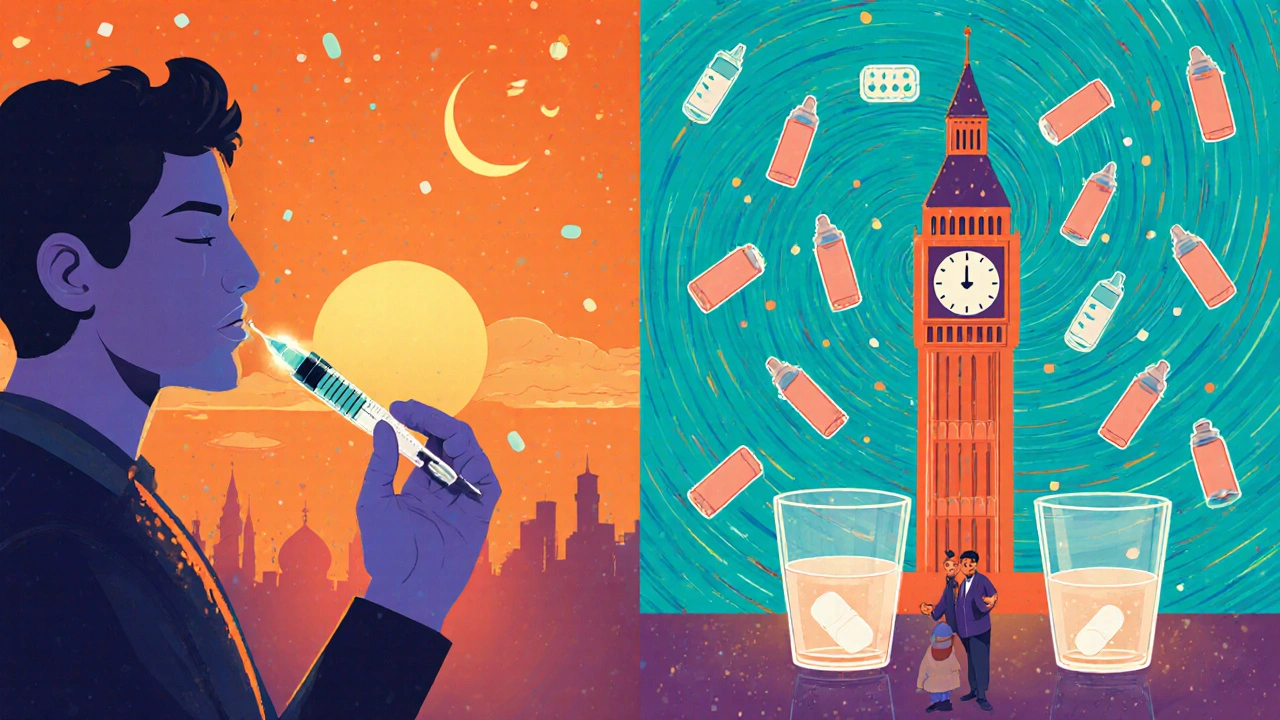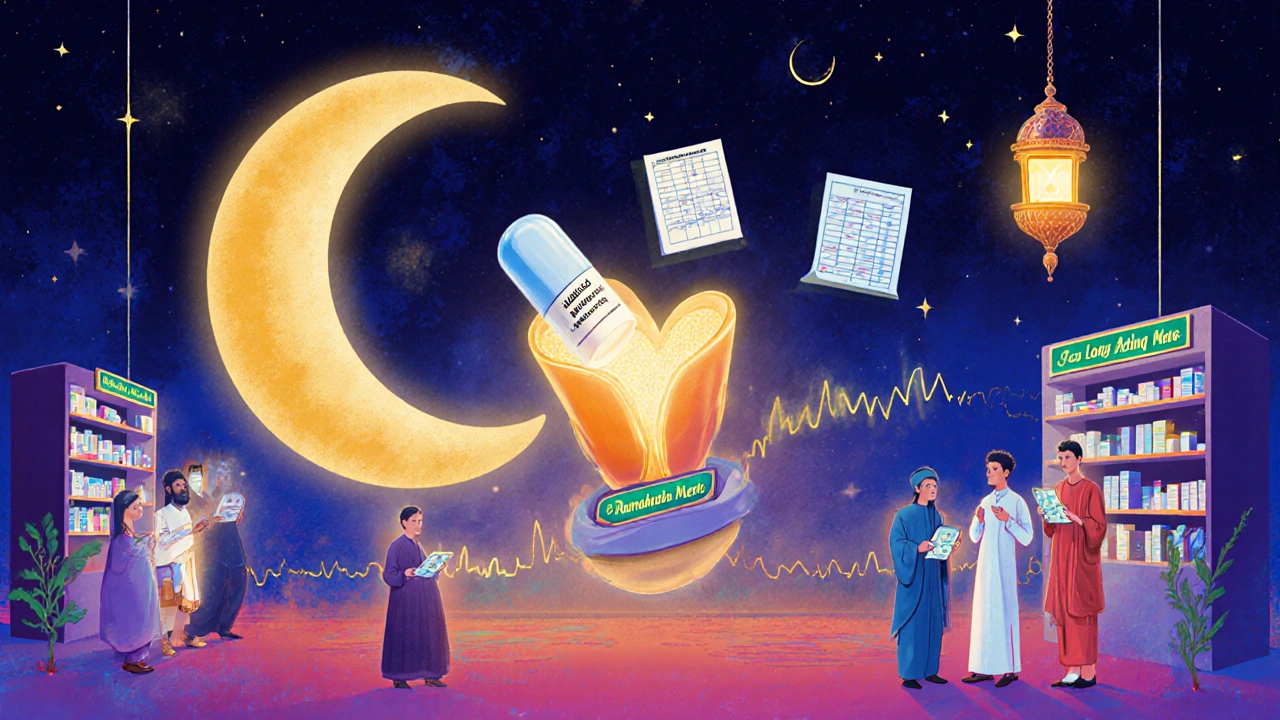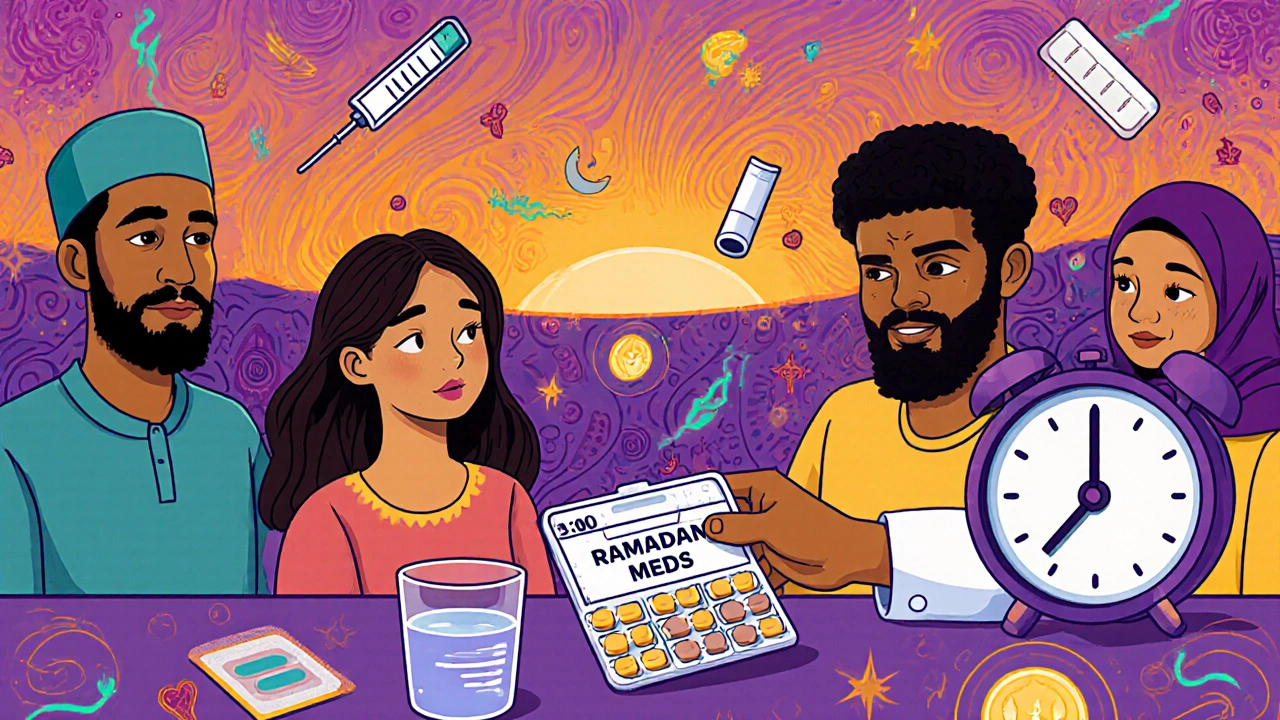Fasting Medication Timing Calculator
This tool helps you safely adjust your medication schedule during religious fasting periods. Important: Always consult your doctor before making any medication changes.
When you're fasting for religious reasons, your body is already under a different rhythm. No food. No water. No oral meds. But what if you take pills every day for high blood pressure, diabetes, or thyroid issues? Can you still fast safely? The answer isn't simple. It depends on the drug, the condition, and how your body responds. Millions of people around the world - especially Muslims observing Ramadan - face this exact dilemma every year. And it’s not just about willpower. It’s about science, timing, and knowing what’s safe.
How Fasting Changes How Your Body Handles Medicine
Fasting isn’t just skipping meals. It changes how your body absorbs, processes, and gets rid of drugs. When you eat, your stomach acid, digestive enzymes, and blood flow all shift. That affects how quickly a pill dissolves and enters your bloodstream. Some medications need food to be absorbed properly. Others work better on an empty stomach. When you’re fasting, you lose those natural cues. For example, levothyroxine, a common thyroid medication, must be taken on an empty stomach, at least 30 minutes before anything else. During Ramadan, many people switch from morning to evening dosing - right before Iftar (sunset meal). Studies show this keeps thyroid hormone levels stable. In fact, some patients need a small dose increase (25-50 mcg) during Ramadan to prevent TSH spikes, then taper back after. That’s not guesswork. It’s backed by clinical data. Blood pressure meds work differently too. If you’re on a once-daily pill, taking it at Iftar usually works best. It keeps your blood pressure controlled through the night and into the next fasting day. But if you’re on a twice-daily drug, split the doses: one at Suhoor (pre-dawn), one at Iftar. That keeps steady levels without breaking your fast.What Medications Can You Keep Taking?
Not all meds are created equal. Some can be adjusted easily. Others need a complete rethink.- Once-daily meds: Take at Iftar or Suhoor. Antibiotics? Usually best after Iftar, unless the label says otherwise.
- Twice-daily meds: One dose at Suhoor, one at Iftar. This is the gold standard for hypertension, diabetes, and many chronic conditions.
- Three or more times a day: This is where it gets tricky. If you’re on a medication that needs four or six-hour spacing, like propylthiouracil for hyperthyroidism, your doctor may switch you to methimazole - which only needs twice-daily dosing. Same goes for some painkillers or antibiotics. Switching to a long-acting version can make fasting possible without risking your health.
What About Non-Oral Medications?
If you’re worried about breaking your fast, remember: not everything you take orally counts. Many religious authorities agree that non-oral medications don’t invalidate the fast. That includes:- Injections (insulin, vaccines, antibiotics)
- Inhalers (for asthma or COPD)
- Nasal sprays
- Eye and ear drops
- Transdermal patches (nicotine, pain, hormone)
- Suppositories

When You Can’t Skip the Dose - And What to Do
Some conditions are too dangerous to pause. If you’re on blood thinners, epilepsy meds, or heart medications, stopping even for a day can lead to a stroke, seizure, or heart attack. In these cases, fasting isn’t optional - your health is. Religious scholars across Islam, Judaism, and Christianity agree: if fasting harms your health, you’re not required to do it. In Islam, this is clearly stated in the Quran: “...and do not kill yourselves [or one another]. Indeed, Allah is to you ever Merciful.” (4:29). Many Muslim doctors and imams work together to help patients make informed choices. If your doctor says you need to take a pill during the day, take it. Break your fast if needed. You haven’t failed. You’ve chosen life.Hydration, Food Interactions, and Timing Tips
Even if you adjust your meds right, dehydration is a silent risk. Fasting during summer months - when Ramadan falls in May or June - can mean 17-hour fasts in places like Canada or the UK. That’s a lot of time without water.- Drink plenty of fluids between Iftar and Suhoor. Avoid caffeine - it makes you lose water faster.
- Don’t load up on sugary drinks or fried foods at Iftar. They spike blood sugar and crash you by morning.
- Take pills with water, even if it’s just a sip. Most religious rulings allow water to swallow medicine.
- Wait 30 minutes after taking an empty-stomach drug before eating. Same for meds that need food - wait until your meal.

How to Plan Ahead - The 5-Step Guide
You don’t wait until the last minute. Planning starts weeks before Ramadan.- See your doctor 4-6 weeks before Ramadan. Bring your full med list. Ask: Can I adjust timing? Do I need a different drug?
- Ask about alternatives. Is there a long-acting version? Can you switch from three doses to one?
- Check with your religious leader. Some medications are allowed. Others aren’t. Get clarity.
- Set reminders. Use your phone or a Ramadan medication app (like MedZed, launched in early 2024) to track Suhoor and Iftar times.
- Have an emergency plan. If you feel dizzy, confused, faint, or your blood sugar drops below 70 mg/dL - break your fast. Take your medicine. Call your doctor.
What’s Changing in Healthcare
Ten years ago, most doctors didn’t know how to handle Ramadan fasting. Now, things are different. The NHS in the UK includes Ramadan guidelines in their clinical handbooks. U.S. pharmacy schools now teach religious fasting as part of cultural competency. Over 68% of big pharmaceutical companies have added Ramadan-specific info to their patient materials. That’s up from 42% in 2019. Pharmacists are stepping up too. CVS Health has trained teams to help Muslim patients adjust meds. Pace Pharmacy offers Ramadan-specific counseling. In Sydney, Melbourne, and Toronto, community health centers now host pre-Ramadan medication clinics. The future? Better long-acting drugs designed for fasting cycles. Apps that sync with EHRs. Standardized guidelines from Islamic medical groups expected in late 2024. This isn’t just about religion. It’s about medicine becoming more human.Final Thought: Your Health Comes First
Fasting is spiritual. But your body doesn’t care about piety - it cares about balance. If your meds keep you alive, stable, or out of the hospital, they’re part of your faith too. There’s no shame in adjusting your schedule. No sin in choosing health. The goal isn’t to fast perfectly. It’s to fast safely. And that means talking to your doctor - not waiting until you feel sick.Can I take my pills during fasting hours if I absolutely need them?
Yes - and you should. If your medication is essential for your health - like insulin, blood pressure, or seizure drugs - taking it during fasting hours won’t break your spiritual commitment. Most religious authorities agree that preserving life overrides fasting requirements. Speak with both your doctor and a trusted religious leader to confirm what’s allowed in your faith tradition.
Does taking insulin break my fast?
No. Insulin injections are not considered food or drink and do not break the fast according to most Islamic scholars. The same applies to all injectable medications, including antibiotics, hormones, and vaccines. The key is whether the substance enters the digestive tract. Since injections bypass the mouth and stomach, they’re permitted.
What if my medication needs to be taken with food, but I’m fasting?
Talk to your doctor. Many medications that require food can be safely switched to a version that doesn’t. For example, some antibiotics or cholesterol drugs have extended-release forms that can be taken on an empty stomach. If switching isn’t possible, take the dose with your Suhoor or Iftar meal. Even a small snack like a date or a few nuts can be enough to meet the food requirement without breaking your fast.
Can I use inhalers or nasal sprays while fasting?
Yes. Inhalers, nasal sprays, eye drops, and skin patches are universally accepted during fasting by Islamic scholars because they don’t enter the digestive system. They’re treated like breathing or applying lotion - not eating or drinking. People with asthma, allergies, or eczema can continue using these without concern.
I have diabetes. Is it safe to fast during Ramadan?
It can be - but only with careful planning. About 24% of diabetic patients experience hypoglycemia during Ramadan without proper management. Work with your endocrinologist to adjust insulin doses, monitor blood sugar more often, and avoid sugary foods at Iftar. Many patients successfully fast by switching to once-daily insulin or using continuous glucose monitors. If your blood sugar drops below 70 mg/dL, break the fast immediately. Your health matters more than the fast.
What should I do if I feel dizzy or weak during my fast?
Stop fasting immediately. Dizziness, confusion, rapid heartbeat, or extreme fatigue are signs your body is in danger. Drink water, eat something light, and take your medication if needed. Then call your doctor. Fasting is meant to bring peace, not harm. No religious obligation requires you to risk your life. Your safety is the priority.
Are there any medications I should avoid during fasting?
Not necessarily - but some require extra caution. NSAIDs like ibuprofen can irritate your stomach without food, increasing ulcer risk. Diuretics can cause dehydration. Some antibiotics need food to work. The solution isn’t to stop them - it’s to adjust timing or switch to safer alternatives. Always consult your pharmacist or doctor before Ramadan to review your full list.
How do I know if my medication schedule has changed after Ramadan?
After Ramadan, your body readjusts to regular eating patterns. Some medications may need to return to their original timing or dosage. For example, people who increased their levothyroxine dose during Ramadan often need to reduce it back after 2-3 weeks. Don’t assume everything stays the same. Schedule a follow-up with your doctor 1-2 weeks after Ramadan ends to check lab results and adjust meds as needed.

Margo Utomo
November 16, 2025 AT 08:16OMG I love this post so much 🙌 Like, finally someone wrote the Ramadan-medication guide I wish my doctor had handed me in 2019. I’m diabetic and took insulin during the day last year because I passed out at work. My imam said it was fine. My aunt said I was ‘breaking my ibadah.’ I told her my blood sugar doesn’t care about your opinions. 🤷♀️💊
George Gaitara
November 17, 2025 AT 08:56There are grammatical errors in this post. ‘Your body doesn’t care about piety’ - should be ‘Your body doesn’t care about piety.’ And ‘Iftar’ is not capitalized in the middle of a sentence. Also, ‘Suhoor’ is misspelled twice. This is amateur hour. If you’re going to write about medical science, at least proofread. I’m shocked this got upvoted.
Deepali Singh
November 17, 2025 AT 15:28Interesting data, but where’s the citation for the 68% pharma company stat? And ‘Methimazole is better than PTU’ - that’s a generalization. PTU still has a role in pregnancy. Also, no mention of renal dosing adjustments in fasting patients with CKD. This feels like a marketing pamphlet disguised as clinical guidance. I’d like to see the original studies.
Sylvia Clarke
November 18, 2025 AT 06:06Let’s pause for a moment and appreciate how breathtakingly human this is. We’re talking about people who are trying to honor centuries-old spiritual traditions while navigating a modern medical system that was built on a 9-to-5, three-meals-a-day, Western-centric model. And now? Pharmacists in Toronto are offering Ramadan counseling. CVS has trained teams. This isn’t just medicine - it’s justice. It’s dignity. It’s the kind of innovation that doesn’t make headlines but changes lives. I’m not crying, you’re crying. 🫂
Jennifer Howard
November 19, 2025 AT 02:20I find it deeply concerning that this post encourages people to break their fast for medication. The Quran clearly states that fasting is obligatory unless one is ill. And what defines illness? Who gets to decide? I’ve seen people take insulin and say it’s ‘not eating’ - but it’s still a chemical substance entering the body. This is slippery slope thinking. If we allow injections, what’s next? IV fluids? Oxygen masks? Where do we draw the line? This is dangerous relativism.
Julie Roe
November 19, 2025 AT 19:29I’m a nurse who works in a Muslim-majority community, and I’ve seen so many patients stress themselves into the ER because they didn’t want to ‘break’ their fast. One woman skipped her blood pressure meds for three days and ended up with a TIA. Another guy with diabetes didn’t check his sugar because he was afraid to admit he needed to eat. This post? It’s the kind of thing I print out and hand to every patient during Ramadan prep. No judgment. No guilt. Just facts. And if your doctor says ‘take it,’ take it. Your soul doesn’t need you to be sick to be holy.
jalyssa chea
November 20, 2025 AT 09:15why do people think they can just switch meds like its a playlist? my cousin did that and got a seizure because he changed his epilepsy med timing. dont be a dumbass. if ur on meds dont mess with them. just dont fast. its not that hard. god dont want you dead
Gary Lam
November 22, 2025 AT 05:06As a Filipino Muslim who grew up in the Midwest, I remember my abuela crying because she thought her insulin made her ‘not a good Muslim.’ This post? It’s the letter she never got. I’ve sent this to my entire family. To my imam. To my pharmacist. To my boss. Everyone needs to read this. Also - yes, you can take your inhaler. Yes, you can use nasal spray. Yes, you can swallow a pill with a sip of water. It’s not cheating. It’s caring for the temple you were given.
Peter Stephen .O
November 23, 2025 AT 19:52Bro this is fire 🔥 I didn’t know insulin was allowed. I thought I had to choose between Allah and my pancreas. Now I’m gonna talk to my doc next week and switch to once-daily. Also - love the MedZed app rec. I’m downloading it right now. And yeah, no more sugary jalebi at iftar. I’m gonna eat lentils and dates like a grown-up. Thank you for not making me feel like a failure for needing meds. 🙏
Andrew Cairney
November 24, 2025 AT 04:49Wait… so you’re telling me Big Pharma is pushing Ramadan-friendly meds because they want to sell more drugs? And the NHS and CVS are ‘helping’ because they’re secretly harvesting our data? This whole thing feels like a trap. What if the ‘long-acting’ meds are just slow-release poison? And why is no one talking about the 2023 CDC memo about fasting and immune suppression? This is a distraction. They want us distracted while they roll out the next vaccine phase. I’m not taking any meds unless I know the batch number.
Rob Goldstein
November 25, 2025 AT 13:26From a clinical pharmacy perspective, this is one of the most well-rounded summaries I’ve seen. The distinction between oral vs. non-oral routes is critical - and often misunderstood. The key point about levothyroxine dose titration during Ramadan is backed by multiple RCTs, including a 2022 meta-analysis in the Journal of Clinical Endocrinology. Also, the recommendation to avoid caffeine during non-fasting hours? Spot on. Caffeine’s diuretic effect compounds dehydration risk. And the 10-20% basal insulin reduction? That’s standard of care per ADA guidelines. This isn’t just advice - it’s evidence-based practice.
vinod mali
November 25, 2025 AT 17:01i live in delhi. my neighbor is 78 and takes 6 pills a day. he fasts. his doctor told him to take two at suhoor, two at iftar, and two with a tiny bit of water at noon. he says its fine. he still prays taraweeh. he didn't ask anyone's permission. he just did it. maybe we overthink this too much. sometimes the body knows.